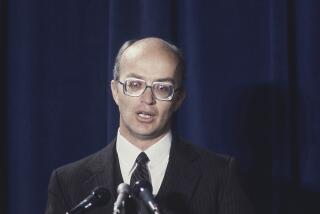Opposition Dies : Webster Gains Acceptance as Head of CIA
WASHINGTON — When William H. Webster was appointed director of central intelligence last year, agents and analysts reported that the halls of the nation’s spy headquarters were filled with grumbling and complaints.
The Judge, as he likes to be called, did not understand spy lingo. Acronyms and abbreviations such as CC&D; (cover, concealment and deception) and HUMINT (human intelligence or, simply, spies) went right over his head.
“Memos always took longer to write. Briefings sometimes took twice as long as they should have,” one CIA analyst said. “Every term, every concept had to be painstakingly written out in full or explained.”
Even more important, in the aftermath of the Iran-Contra affair, officials who worked in the secret operations sector of the agency feared that Webster’s reform efforts would significantly curtail their covert activities. Concerns that Webster might weaken the agency’s covert capabilities even triggered a campaign to oust him as director, a secret effort that was reported last month in The Times.
In the end, however, Webster overcame such opposition and even won the support of some of his most skeptical associates. The drive to replace the director--an effort that was pushed largely by individuals outside the agency--quickly ran out of steam as President-elect George Bush made it clear that he had confidence in his tennis partner and friend.
Indeed, in a reflection of his impact on the U.S. intelligence community over the last 18 months, many of those who groaned the most were among the first to welcome Webster’s reappointment, which was announced today. The Judge turned out to be a quick learner.
Has Learned to Run Agency
“First of all, he provides important continuity for a new administration at a time (when) the agency has not fully recovered from Iran-Contra,” one insider said. “Second, he has finally learned how to maneuver and run this place. It would be a mutual loss if he had been replaced.”
The CIA’s watchdog on Capitol Hill apparently thought so, too. A statement from Sen. David L. Boren (D-Okla.), chairman of the Senate Select Intelligence Committee, welcomed the decision, which had been expected for so long that some agency insiders were getting nervous about the implications of the delay.
“Judge Webster and Deputy Director Robert Gates have helped to restore public confidence in the CIA during a very troubling period,” the Boren statement said. “This action by the President-elect in assuring continuity at the CIA sends an important message that he is committed to a professional, nonpolitical intelligence service.”
Although it was not part of the Bush announcement, Gates also will be staying. “Webster wants to keep the team intact,” a CIA spokesman said.
Relations With Congress
Improving the agency’s relations with Congress has been one of Webster’s primary contributions in the rocky aftermath of the Iran-Contra episode. Ironically, it has led to one of the few criticisms of him from within the CIA.
“Some in the agency think he’ll do whatever Congress wants, and they don’t take well to the intrusion from the outside world,” one congressional staff member said.
Two particularly sensitive points have been the dismissals and reprimands of CIA personnel that he issued after an internal investigation of CIA involvement in the Iran-Contra affair and his seeming reluctance to use covert action.
In contrast to the style of his controversial predecessor, the late William J. Casey, Webster ordered a review of all secret activities conducted by the CIA. Insiders say that Webster asked some tough questions and demanded legal justification of every covert action before the fact, rather than after.
One longtime associate suggested, however, that Webster has not blocked covert operations. “The Judge simply asks a lot of difficult questions and requires legal justification for every step taken,” he explained.
Said a congressional aide: “He’s very lawyerly, which is one of the reasons we have fewer differences today.” Before his tenure at the FBI, Webster was a federal judge and a U.S. attorney.
He faced similar problems in 1978, when he took over the FBI, which was then still recovering from charges of illegal investigative activities and widespread civil rights violations. Over the next nine years, he overhauled the bureau’s image and mission.
Cleanups and Reforms
Although his initiatives at the CIA so far have amounted more to cleanups and minor reforms than a major overhaul, associates say that he is on the verge of bigger internal projects. “Webster is just getting into it. He would like to stay another year or two,” one said.
At the FBI, he received relatively little public attention while conducting his reforms. “Webster has been so polite, so studiedly colorless that few Americans seem to have noticed either the magnitude of the changes or the man who effected them,” wrote a biographer in The Washingtonian magazine. The same is true at the CIA, insiders say.
More than one friend or associate described him as “squeaky clean.” He is an avid and sometimes single-minded tennis player, and his idea of humor was to shout “FBI!” when it was his turn to serve. FBI, he would tell opponents, also stands for “first ball in.”
And, sometimes intimidating to opponents, friends say, are the bodyguards and drivers who often wait for him at court side. He plays regularly with many of Washington’s most noted socialites and power-brokers, as well as Bush.
Devastated by Wife’s Death
After Webster’s wife, Drusilla, died in 1984, the Bushes offered him their home in Kennebunkport, Me., as a retreat. The Websters, both devout Christian Scientists, had been very close, and he was devastated when she died of breast cancer.
Friends say that he still puts family before all else. In 1986, he was elected Father of the Year by the National Father’s Day Committee in New York. Colleagues say that, on the 18 foreign trips he has made since taking the CIA helm, he has always stopped to buy gifts for his three children and a growing brood of grandchildren.
More to Read
Sign up for Essential California
The most important California stories and recommendations in your inbox every morning.
You may occasionally receive promotional content from the Los Angeles Times.










